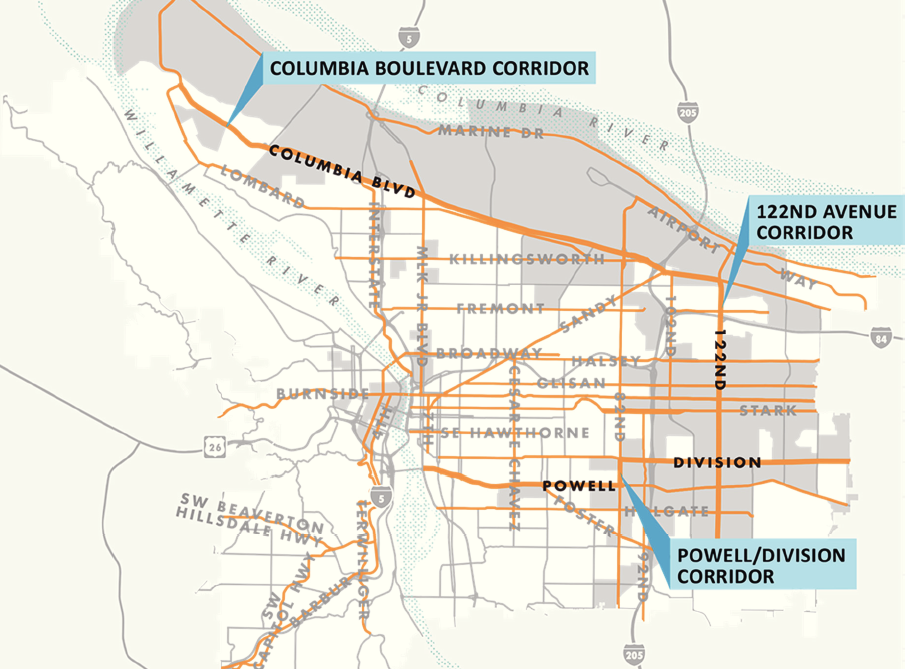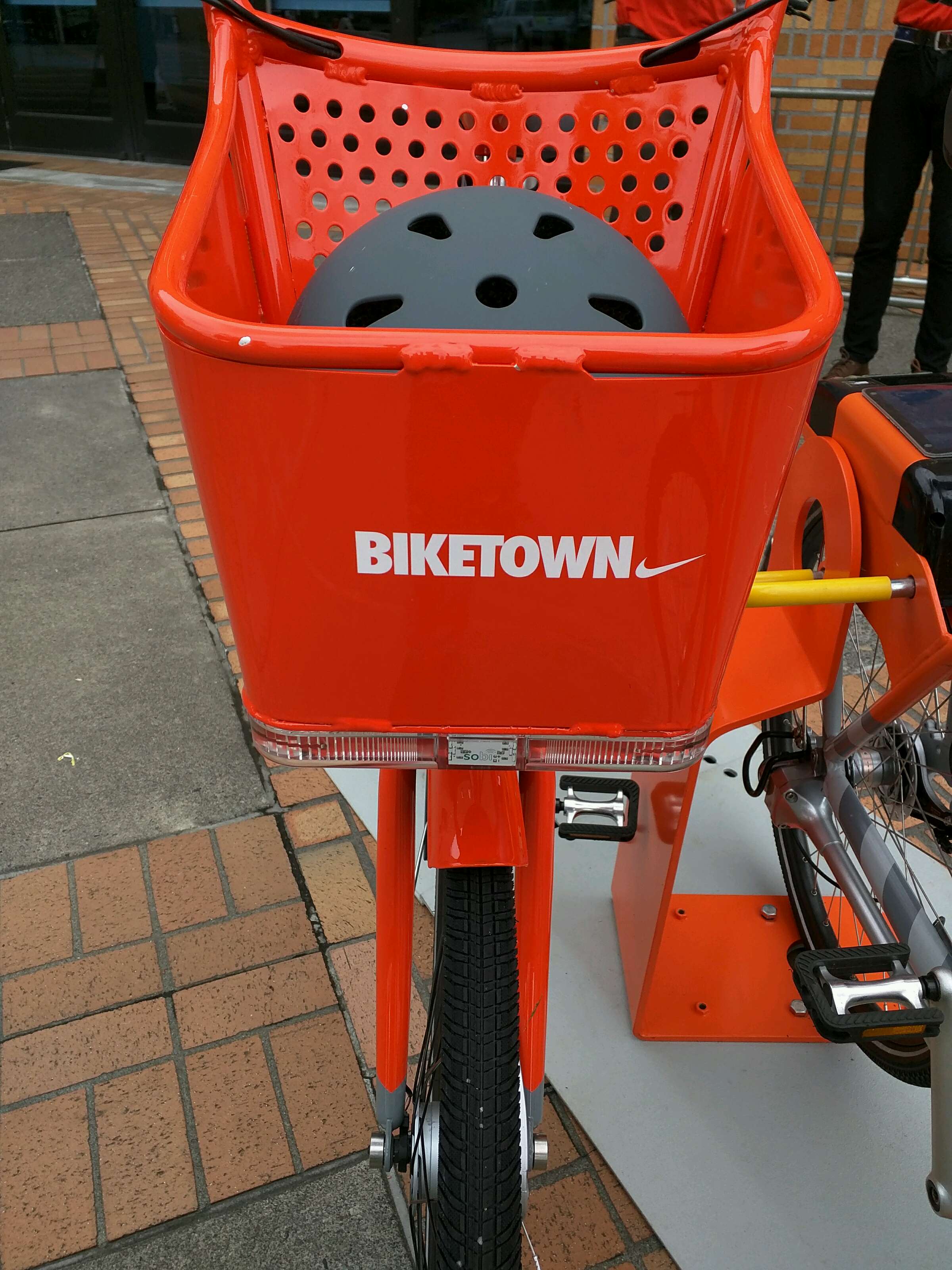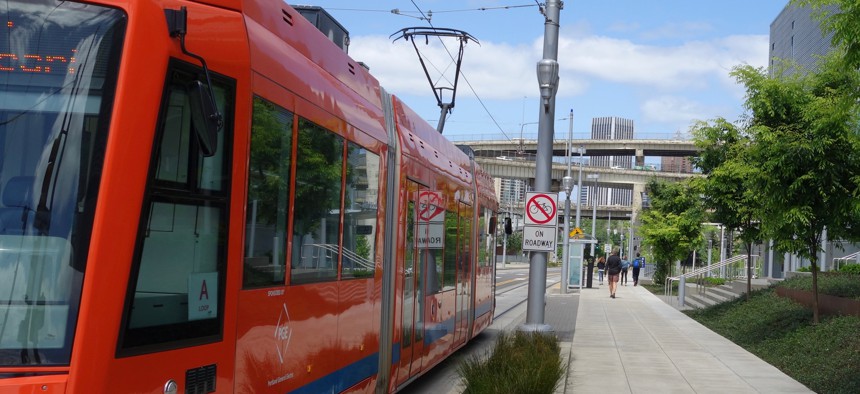Connecting state and local government leaders
While Rose City’s plan leverages technology, “this is really a people project.”
This is the third in a series of profiles on the seven U.S. Department of Transportation Smart City Challenge finalist cities, which will be in Washington, D.C., on Thursday, June 9 to present their final grant applications to U.S. Transportation Secretary Anthony Foxx. Read our other Smart City Challenge finalists profiles on Austin, Columbus, Denver, Kansas City, Pittsburgh and San Francisco. | REGISTER for the June 9 Smart City Challenge livestream
PORTLAND, Ore. — In late May, at the Oregon Museum of Science and Industry, many of the technology partners in Portland’s U.S. Department of Transportation Smart City Challenge grant application were gathering to show off their mobility solutions.
Steve Hoyt-McBeth of BikeTown, Portland’s newest bike sharing service set to roll out this summer, was demonstrating the company’s app-based, wireless bikeframe that’s designed to send and receive user data. Lyft was onsite, too, having just signed a partnership with the city to be a preferred last-mile transport option for users of the region’s public transit system, Trimet. Moovel, a Daimler-owned public transit app service was also demonstrating its mobility tool.
As one of seven Smart City Challenge finalists, a $40 million award from the USDOT—with an additional $10 million from Seattle-based Vulcan—Portland is looking to leverage its deep history as a city on the leading edge of smart transit. More broadly, Portland is pitching its mobility solution as a way to create greater social equity, bringing outer reaches of the city into the fold. They have titled their project UB (Ubiquitous) Mobile PDX.
For both the USDOT and its applicant cities, the Smart City Challenge is intended to be an experiment. The grant winner will conduct trials over five years—the first three more intensively under the USDOT funding, and the last two under the Vulcan funding. The idea is to produce solutions that not only help the winning city, but all U.S. cities looking for mobility solutions. High return on investment: that’s the real prize the USDOT hopes to harvest, for the entire country.
As Transportation Secretary Anthony Foxx pointed out in his meeting with Portland leaders at Portland Community College on May 18, the grant challenge is purposely open-ended. “The Smart City Challenge is not prescriptive,” said Foxx. “It says: ‘Here are some parameters, and how might you address those challenges?’”
It bears mentioning that the USDOT has, in recent years, operated under funding constraints. Gasoline tax revenues have stagnated. Total U.S. public construction spending has also seen little growth, stuck at roughly 1.5 percent of GDP for the past 20 years (except during the Great Recession, when GDP fell). Forced to become increasingly creative at a time of political deadlock, USDOT has focused on smaller targeted funding bursts, designed to produce a high return. The TIGER grant is one obvious example. The USDOT’s Smart City Challenge clearly follows this model.
Maurice Henderson, assistant director of Portland’s Bureau of Transportation, described Portland’s goals rather nicely.
“If you stretch out your hand, the central part of Portland is like your palm, but out where the fingers extend there are gaps—significant gaps between the fingers where Portland’s long track record of success in transit has not yet touched,” he said in an interview. “We want to use this grant to solve that problem, and reach these people.”
One of the friendliest cycling cities in the world, Portland is typically thought of as a place to live without a car, as its urban core is criss-crossed not with motorways but with light rail, dedicated bike lanes, and streetcars. Indeed, Portland is also known nationally as being a city that fought to limit highway expansion early on.

Less well known, however, is Portland’s vast East Side where the urban boundary stretches far into suburban-like neighborhoods. When Secretary Foxx visited to hear Portland’s pitch from Mayor Charlie Hales, and other transport and technology leaders, the venue chosen was Portland Community College’s (PCC) southeast campus: located in the Powell / Division Corridor, a target area of UB Mobile PDX.
PCC’s campus, new and leafy, is surrounded by long, broad boulevards that form challenging barriers to walkable neighborhoods, and the formation of villages. These are precisely the areas where Communities of Concern—the phrase used in Portland’s Smart City Challenge proposal—are located. Portland would use the USDOT grant to address the lack of access to services, and especially lack of transport, so that community members could more easily commute to jobs.
Portland’s government has already laid the groundwork to pursue these goals, however, regardless of its bid to win the USDOT grant.
Henderson said that the city has been active in the community, getting feedback, and visiting public schools to listen to ideas from students.
“Portland is not only growing, but changing,” Henderson said. “In our schools, 50 percent of students are now people of color and collectively they speak more than 80 different languages.” Henderson observed that the location of many Portland Public Schools provides an excellent map of needed improvements, where public space needs to become safer. Indeed, in the USDOT’s Smart City notice of funding opportunity applicants are instructed to place special importance on safety.
Henderson also observed that while the city will leverage technology, “this is really a people project.”
But Portland is fortunate to have also covered itself well, in its solution-set capability. In fact, a Portland mobility startup, GlobeSherpa—which built some of the best early smartphone apps for transit users—is now part of Moovel, the Daimler-owned mobility venture. And it appears that the latest version of its app, Ride-Tap, deployed by Portland’s transit agency Trimet, could be an emerging platform in the vision of UB Mobile PDX.
“As I look into the future, the current pilot (partnership) with Lyft and Car2GO is an indicator,” said Mac Brown, Moovel’s vice president of business development who himself is a native Portlander. “BikeTown and others could join this platform; there is a mutual and beneficial opportunity.”

At the recent BrainstormE conference in Carlsbad, California, Ford Motor Co. executive chairman Bill Ford was reported to have said: “If the car industry gets mobility wrong, it could end up like the handset industry, all the value is elsewhere.”
That suggests that even as cities like Portland conduct their smart city experiments, big changes in global transport will be quickly pressing onward. “We’ve been watching the marketplace for some time, and the evolution of mobility companies,” Brown told Route Fifty. “Large manufacturers see the writing on the wall. If you see what Daimler is doing with [self-driving] trucks, the shift is happening now.” Portland also has a very significant freight, rail, and truck economy that it’s UB Mobile PDX proposal would address, as the bulk of that traffic moves across city streets, to engage with its many ports.
Henderson feels his city is very well positioned to secure the USDOT’s Smart City Challenge funding. When asked what the next steps would be, if Portland did in fact win, he gave a friendly, good-natured: “Well actually, when we do win!”
Henderson explained that Portland would utilize three key strengths, going forward: “We are an equity champion, we are an innovator, and we’re an educator. And we will start right away in the corridors of our city where the biggest returns are possible.”
Portland’s treatment of streets, public transportation and neighborhoods has of course become a model for other cities around the country. The city regularly receives delegations or urban planners from China, for example. PBOT is seeking to follow the DOT directive to make its Smart City proposal and its next round of solutions both “replicable, and scaleable,” according to Henderson. One national problem that Portland may help to solve, especially on its widely spread out East Side, is the challenge to retrofit suburbia. Solutions made here really would be exportable to other cities.
“One of the most impactful things for me in this process has been visiting the schools, and talking to 6th, 7th, and 8th graders about the Smart City proposal,” Henderson said. “One girl said she was so happy that ‘people in power would come to ask us, how the city should look.’”
Portland of course is also a strong advocate and adopter of Vision Zero: the safety initiative looking to bring traffic fatalities to zero. Through UB Mobile PDX, Portland seeks to achieve high standards of safety, while continuing to pursue its extension of the transit franchise to everyone.
“This is actually a multi-generational opportunity,” Henderson said. “All cities will benefit from this exercise--but Portland truly wants to win; we want the opportunity to become that teacher.”
Gregor Macdonald is an independent journalist who regularly covers energy, transport and urban policy. He is based in Portland, Oregon

NEXT STORY: Kansas City’s Smart City Challenge Bid Builds Upon Its IoT, Transportation Investments



